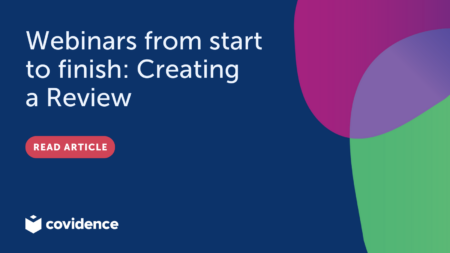Learn how to create a comprehensive search for your review
Carrie Price, health professions librarian at the Albert S. Cook Library at Towson University in Towson, Maryland, is back to share some tips how to become a better searcher.
Systematic reviews require collating and synthesizing available evidence for use in clinical and healthcare decision making – which means creating a comprehensive search that is also reproducible. The Cochrane Handbook recommends that systematic “searches should aim for high sensitivity.”
Maybe you are a new medical librarian, or a librarian who has recently transitioned to systematic review services. Perhaps you are a clinician or researcher who would like to have a better understanding of the search process. After all, the results of the literature search create the foundation, and thereby, conclusions, of the review!
How can you become a better searcher? There are many resources available to help you become a pro, including systematic review courses and curriculums offered by various institutions, but there are also some published guidance documents.
1. The Press Checklist
The PRESS Checklist. PRESS is an acronym for “peer review of electronic search strategies.” Myriad systematic review guidance recommends a peer review of the search strategy. Peer review is important for lots of reasons: to establish appropriate translation of the research question, to check for errors, to ensure correct search terminology, and more. There are several publications detailing PRESS’ utility in systematic searching, but the 2015 guideline from McGowan et al., provides an evidence-based checklist and a recommendation for librarian practice. These items prompt the searcher and/or peer review to check the search for relevant subject headings, “explosion” of subject headings, correct use of Boolean operators, misspellings or errors, line numbers, and justifiable use of limits and filters. If you are a librarian involved in designing search strategies for systematic reviews and want to be part of a community in which you can have your search strategies peer reviewed while occasionally peer reviewing strategies for other librarians, ask to join PRESSforum.
2. THE PRISMA-S
The PRISMA-S. New in 2021, the PRISMA-S is an extension of the Preferred Reporting Items for Systematic Reviews and Meta-Analyses (PRISMA), a widely recognized reporting guideline. The PRISMA-S provides a checklist detailing what information should be reported in the search methods. Understanding how the search should be reported can help a novice searcher approach the literature search in a practicable way, such as saving the proper documentation, making note of platforms, databases searched, gray literature searching, and more.
While these two publications can be incredibly helpful, if you want to learn searching on a granular level, check out the Medical Library Association’s Essential Guide to Becoming an Expert Searcher: Proven Techniques, Strategies, and Tips for Finding Health Information. This book explores searching on a theoretical level, providing thoughts about the reference interview, subject searching, database indexing, and building your search skills so that you, too, can become an expert searcher.
The ABCD Framework
Searching is a fine balance of trial and error, practice, intuition, and testing. If you are new to searching, try following the ABCD framework (Price et al, 2020) to make sure you get started off right:
1. Assess Your Topic, Scope and Goals
It will be impossible to assemble an effective search if your topic isn’t clearly defined and you don’t have an end product in mind.
2. Brainstorm Search Terms
Authors won’t use the same terminology to refer to the same concept. There are also variations in spellings, often found between British and American English words. If you want to find all available evidence, you should come up with lists of potential terms to use for each search concept.
3. Choose Resources
The Cochrane Handbook recommends MEDLINE, Embase, if available, and the Cochrane Register of Controlled Trials (CENTRAL) as resources to search. What other resources might you have access to through your institutional library? What other resources are appropriate for your topic?
4. Document Your Searches
Reproducibility is a key concept in evidence-based medicine. Readers evaluating your final publication should be able to understand how you searched to find what you found. Document your searches in a document that will be included in the supplemental material of your publication.
The “document” phase may entail some hard-learned lessons, but there is an incredible community of practice of expert searchers and medical librarians present on Twitter (#ExpertSearching, #medlibs) that you can reach out to for help.
Patience is key! Ask questions, reach out for help, and you’ll be an expert searcher in no time at all.
References
Higgins JPT, Thomas J, Chandler J, Cumpston M, Li T, Page MJ, Welch VA (editors). (updated February 2021). Cochrane Handbook for Systematic Reviews of Interventions version 6.2. Cochrane. www.training.cochrane.org/handbook.
Jankowski, T. A., & Medical Library Association. (2008). The Medical Library Association essential guide to becoming an expert searcher: Proven techniques, strategies, and tips for finding health information. New York: Neal-Schuman.
McGowan, J., Sampson, M., Salzwedel, D. M., Cogo, E., Foerster, V., & Lefebvre, C. (2016). PRESS Peer Review of Electronic Search Strategies: 2015 Guideline Statement. Journal of Clinical Epidemiology, 75, 40–46. https://doi.org/10.1016/j.jclinepi.2016.01.021
Price, C., Kudchadkar, S. R., Basyal, P. S., Nelliot, A., Smith, M., Friedman, M., & Needham, D. M. (2020). Librarian integration into health care conferences: a case report. Journal of the Medical Library Association: JMLA, 108(2), 278. https://dx.doi.org/10.5195%2Fjmla.2020.803
Rethlefsen, M. L., Kirtley, S., Waffenschmidt, S., Ayala, A. P., Moher, D., Page, M. J., Koffel, J. B., & PRISMA-S Group (2021). PRISMA-S: an extension to the PRISMA Statement for Reporting Literature Searches in Systematic Reviews. Systematic Reviews, 10(1), 39. https://doi.org/10.1186/s13643-020-01542-z



